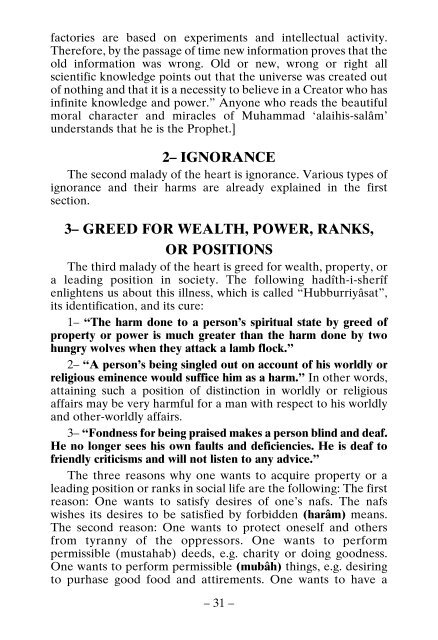Ethics of Islam
Ethics of Islam is taken from the book Berîka by Muhammad Hâdimi. Immorality and ways to get rid of it; 40 depravities and cures to them; usefulness of ethics; what is a soul; strengths of a soul; Personalities emanating from wisdom, courage, chastity and justice are extensively explained.
Ethics of Islam is taken from the book Berîka by Muhammad Hâdimi. Immorality and ways to get rid of it; 40 depravities and cures to them; usefulness of ethics; what is a soul; strengths of a soul; Personalities emanating from wisdom, courage, chastity and justice are extensively explained.
You also want an ePaper? Increase the reach of your titles
YUMPU automatically turns print PDFs into web optimized ePapers that Google loves.
factories are based on experiments and intellectual activity.<br />
Therefore, by the passage <strong>of</strong> time new information proves that the<br />
old information was wrong. Old or new, wrong or right all<br />
scientific knowledge points out that the universe was created out<br />
<strong>of</strong> nothing and that it is a necessity to believe in a Creator who has<br />
infinite knowledge and power.” Anyone who reads the beautiful<br />
moral character and miracles <strong>of</strong> Muhammad ‘alaihis-salâm’<br />
understands that he is the Prophet.]<br />
2– IGNORANCE<br />
The second malady <strong>of</strong> the heart is ignorance. Various types <strong>of</strong><br />
ignorance and their harms are already explained in the first<br />
section.<br />
3– GREED FOR WEALTH, POWER, RANKS,<br />
OR POSITIONS<br />
The third malady <strong>of</strong> the heart is greed for wealth, property, or<br />
a leading position in society. The following hadîth-i-sherîf<br />
enlightens us about this illness, which is called “Hubburriyâsat”,<br />
its identification, and its cure:<br />
1– “The harm done to a person’s spiritual state by greed <strong>of</strong><br />
property or power is much greater than the harm done by two<br />
hungry wolves when they attack a lamb flock.”<br />
2– “A person’s being singled out on account <strong>of</strong> his worldly or<br />
religious eminence would suffice him as a harm.” In other words,<br />
attaining such a position <strong>of</strong> distinction in worldly or religious<br />
affairs may be very harmful for a man with respect to his worldly<br />
and other-worldly affairs.<br />
3– “Fondness for being praised makes a person blind and deaf.<br />
He no longer sees his own faults and deficiencies. He is deaf to<br />
friendly criticisms and will not listen to any advice.”<br />
The three reasons why one wants to acquire property or a<br />
leading position or ranks in social life are the following: The first<br />
reason: One wants to satisfy desires <strong>of</strong> one’s nafs. The nafs<br />
wishes its desires to be satisfied by forbidden (harâm) means.<br />
The second reason: One wants to protect oneself and others<br />
from tyranny <strong>of</strong> the oppressors. One wants to perform<br />
permissible (mustahab) deeds, e.g. charity or doing goodness.<br />
One wants to perform permissible (mubâh) things, e.g. desiring<br />
to purhase good food and attirements. One wants to have a<br />
– 31 –

















